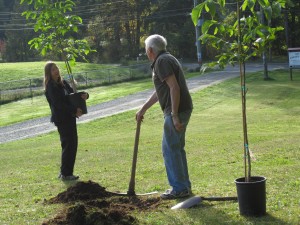Community Building
 I work with a diverse team to support community members and not-for-profit groups in coming together to take collective action and generate solutions to common problems. We take a Community Development approach to helping you create community well-being across the social, environmental, cultural and economic spectrum. Community development initiatives can be small, carried out by a small group of people focused on very specific goals, or they can be large and involve collaboration across organizations, businesses and local government to address complex and inter-related problems that affects the whole community.
I work with a diverse team to support community members and not-for-profit groups in coming together to take collective action and generate solutions to common problems. We take a Community Development approach to helping you create community well-being across the social, environmental, cultural and economic spectrum. Community development initiatives can be small, carried out by a small group of people focused on very specific goals, or they can be large and involve collaboration across organizations, businesses and local government to address complex and inter-related problems that affects the whole community.
We believe that effective community building initiatives arise out of the community itself, when community members initiate, support, organize and plan together, and where inclusion and equity are important values.
We also believe that, as experienced facilitators, grant writers and project managers, we can provide invaluable support and help to increase the likelihood of an initiative’s success. We can support you in articulating your theory of change, addressing a specific task that needs particular expertise, or in facilitating an important meeting, holding space for curiosity and dialogue in the face of complex issues. Where the problems you need to address are large and complex, we can bring our experience with resilience thinking, systems theory, and Collective Impact methods and approaches forward to assist you.
We support community development initiatives by:
• Making sure your initiative is well-planned and integrated into the bigger picture, while also flexible and able to deal with change;
• Facilitating visioning and planning sessions with collaborators and stakeholders;
• Offering tools and processes for creative engagement;
• Helping keep the initiative moving forward to meet its short and long-term goals and objectives, addressing issues as they arise, especially when external funding deadlines are involved;
• Keeping the initiative grounded in best practices; and
• Supporting community leaders and members to engage, dialogue and empower themselves.
We can support you in:
• Clearly articulating the purpose, values and goals of your initiative and your ‘Theory of Change’;
• Engaging the broader community in meaningful dialogue;
• Developing clarity around who is responsible for what and sharing responsibility effectively as a team;
• Organizing and planning together;
• Communicating effectively;
• Learning and applying skills to deal with conflict;
• Developing community leadership skills;
• Integrating resilience thinking as you develop your initiative; and
• Achieving the community’s social, economic, cultural and environmental goals for the broadest community benefit.
We recognize that:
• the connections between social, cultural, environmental and economic sectors and issues matter;
• the diversity of interests within a community need to be recognized;
• finding common ground is important to address issues and take advantage of opportunities; and
• capacity building requires awareness, collaboration, openness to learning, and ongoing dialogue.
What do we mean by Community? 
Community is often thought of in geographic terms – the neighborhood, town, village or region where we live. This geography may or may not have precise boundaries that are understood and accepted by others. For example, First Nations communities often define their territory differently from how the settler community or government defines it. These differences are important to acknowledge and issues of rights, title and autonomy are important to consider. Communities can also be defined by common cultural heritage, language, and beliefs or shared interests or values.
Most of us belong to more than one community, whether we’re aware of it or not. For example, an individual can be part of a neighbourhood community, a faith community and a community of shared interests all at the same time. Our communities are often anchored in our relationships, whether with people or the land.
What do we mean by Community Development or Community Building?
The word “development” is often associated with growth or expansion, and connected to ideas of increased speed, volume and size. Now many people are questioning the concept of growth for a number of reasons – realizing that more or bigger isn’t always better, and that increased consumption won’t necessarily make us happier. We are more often acknowledging that natural resources are limited and that we need to change in ways that reduce our dependence on them. The term “development” does not always mean growth. Nor does it mean finding a quick fix or short-term solution. Development does imply change. Community development can be thought of as a suite of tools and approaches for managing change.
Community Development is often associated with:
• Improving the quality of relationships and the quality of life of community members,
• Caring for people and the environment in better and more effective ways, and
• Identifying and working on solving a community’s problems collaboratively.
Community development is about community building, and inclusion and collaboration are important elements. The process is as important as the results. A primary challenge of community development is to balance the need for long-term solutions with the day-to-day realities that require immediate decision-making and short-term action. This is where deep listening and resilience thinking and practice, looking at people and communities as complex systems that are adapting and transforming at different levels and across different time scales, and coming at problem-solving with a continuous learning focus, can be particularly helpful.
I am happy to sit down with you to discuss your initiative and how we might be of assistance.
Definitions of Community and Community Development adapted from PeerNetBC with thanks.